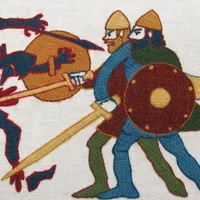7. Flosi brennir hús Njáls
Flosi|burns|house|
|bränner||
7. Flosi brennt Njáls Haus nieder
7\. Flosi burns Njál's house
7. Flosi steekt het huis van Njál in brand
7. Flosi bränner upp Njáls hus
Flosi er enn mjög reiður yfir þessu máli sem gerðist á Alþingi og hann ákveður að drepa Njálssyni.
Flosi||still|very|angry|||matter||happened||the Althing|||decides|||
Flosi is still very angry about this matter that happened in Alþingi and he decides to kill Njálsson.
Flosi nadal jest bardzo zły z powodu sprawy, która wydarzyła się w Alþingi i postanawia zabić Njálssona.
Hann safnar saman vinum sínum og þeir leggja af stað heim til Njáls.
|gathers together||friends|his||they|set out||way|home||
|samlar|||||||||||
He gathers his friends and they set off for Njál's home.
Zbiera przyjaciół i wyruszają do domu Njála.
Njáll stendur fyrir utan húsið sitt þegar hann sér mennina koma.
|stands||outside|house|his|when||sees|the men|
|||||||||männen|
Njáll is standing outside his house when he sees the men coming.
Njáll stoi przed swoim domem, kiedy widzi nadchodzących mężczyzn.
Synir hans ná í vopn og þeir byrja að berjast.
His sons||grab||weapons|||begin||fight
||||vapen|||||slåss
His sons grab weapons and they begin to fight.
Jego synowie chwytają za broń i zaczynają walczyć.
Hans söner tar tag i vapen och de börjar slåss.
Þeir berjast mjög vel.
they|fight||
They fight very well.
Walczą bardzo dobrze.
Margir menn Flosa slasast illa.
many|men||are injured|badly
|||slår sig|
Many of Flosa's men are badly injured.
Wielu ludzi Flosy jest ciężko rannych.
„Þetta er ekkert að ganga hjá okkur,“ segir Flosi.
|||working out for|working out|by|"us"|"says"|
"This is not working for us," says Flosi.
„To nie działa w naszym przypadku” – mówi Flosi.
„Þeir berjast of vel.
||too|well
"They fight too well.
„Walczą zbyt dobrze.
Það er tvennt í stöðunni: Annaðhvort að hætta við (sem leiðir til þess að við verðum allir drepnir) eða þá að brenna þá inni.“
||two options||the situation|either|to|cancel|we||leads|||||will be|all|killed|or|||burn them inside||burn them inside
|||||||||||||||||drepna||||||
There are two options in the situation: Either cancel (which leads to us all being killed) or burn them inside."
W tej sytuacji są dwie możliwości: albo anulować (co prowadzi do śmierci nas wszystkich), albo spalić ich w środku.”
Menn Flosa reyna að kveikja í húsinu.
Men||try||set fire to||the house
||||tända||
Flosa's men try to set fire to the house.
Ludzie Flosy próbują podpalić dom.
Það gengur ekki vel.
|is going||
It's not going well.
Nie idzie dobrze.
„Jæja, strákar, eruð þið að reyna að kveikja í húsinu eða eruð þið að reyna að búa til súpu?“ spyr Skarphéðinn í gríni á meðan konurnar á heimilinu henda vatni og mjólk á eldinn.
well|boys|are you|you||||||||are|||||make||soup||Skarphéðinn||in jest||"while"|the women||the household's|throw|water|and|milk||the fire
||||||||||||||||||||||skämt|||||||||||elden
"Well, boys, are you trying to set the house on fire or are you trying to make soup?" Skarphéðinn asks jokingly while the women in the household throw water and milk on the fire.
„No cóż, chłopcy, próbujecie podpalić dom, czy próbujecie zrobić zupę?” – pyta żartobliwie Skarphéðinn, podczas gdy kobiety w gospodarstwie domowym dolewają wodę i mleko.
Nú ná menn Flosa í hey og kveikja í því.
now|catch|men|||hay||light||it
Now Flos's men catch hay and set it on fire.
Teraz ludzie Flosa łapią siano i podpalają je.
Það gengur miklu betur og þeir ná að kveikja í húsinu.
|goes much better|much better|better|||||set fire||
It goes much better and they manage to set the house on fire.
Idzie znacznie lepiej i udaje im się podpalić dom.
„Verið róleg,“ segir Njáll við fólkið á heimilinu.
be|"Be calm"||||the people||the home
|lugna||||||
"Be calm," says Njáll to the people in the home.
„Bądźcie spokojni” – mówi Njáll do mieszkańców domu.
„Guð er góður, hann lætur okkur ekki bæði brenna í þessu lífi og því næsta.“
God||||lets|us||both||||life||thee|
Gud||||||||||||||
"God is good, he will not let us both burn in this life and the next."
„Bóg jest dobry, nie pozwoli nam spłonąć w tym życiu i w następnym”.

